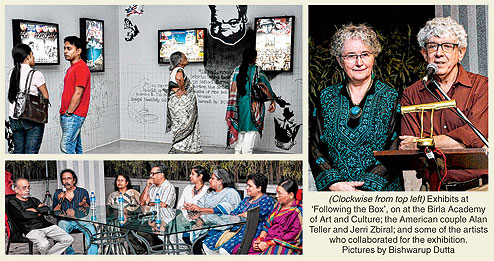"Box- er moddhey chhobi pawa ajob ghotona (Discovering photographs in a box is an amazing thing indeed)"

Thus sang Swarna Chitrakar, from Naya in West Midnapore's
Pingla, displaying her painted scroll on video. The scroll was
displayed at the Birla Academy of Art and Culture as part of
an exhibition titled "Following the Box", that also featured
works of 11 other artists.
The inspiration behind the exhibition (on till March 7)
were photographs found in a box that an American
photographer-artist couple, Alan Teller and Jerri Zbiral, had
bought during an estate sale in Chicago a few years ago.
The 130 photographs - of temples and markets, and depicting
everyday lives of villagers - were taken around Calcutta by an
American soldier in 1945.
Metro had last March reported the journey
of the photographer-artist couple - from Evanston in Illinois,
US - across West Midnapore in search of the places in the
photographs. Their quest was supported by Alan's Fulbright
scholarship.
Scouring libraries and archives in India and the US and
visiting remote locations, Alan and Jerri found several
details about the places, objects and people depicted. But the
identity of the American soldier - who was based in Kharagpur
before being transferred to Okinawa - is yet to be
established.
Which was a good thing because when they launched the
second part of their Fulbright project - which requires them
to recruit Indian artists to respond creatively to the
photographs - these twin mysteries triggered a host of
different responses.
Alan and Jerri were joined by Chhatrapati Dutta, Amritah
Sen, Sarbajit Sen, Sanjeet Chowdhury, Sunandini Banerjee,
Aditya Basak, Alakananda Nag, Mamata Basak, Prabir Purkayastha
and Swarna Chitrakar.
Over one-and-a-half years, the team assembled this show of
new journeys in creativity and sensitivity that breaks mental,
physical and stylistic boundaries of all kinds.
Chhatrapati Dutta, for instance, creates his own corner
"displaying" ideas through a series of six light boxes and 25
little acrylic planes.
He replays the cultural encounters occasioned by the World
War II, viewing the photographs in the context of American war
propaganda posters, memory of American war comics read in
childhood and excerpts from The Calcutta Key, a
manual that used to be handed to US soldiers on arrival.
What pleased the artists most was the free hand they had
been given by Alan and Jerri and the technical assistance they
got from the duo.
Sunandini Banerjee said she had agreed to join the project
after being told that she could participate in any way she
liked. Her digital collages seemed to present India as an
immense, all encompassing and timeless entity that remains
largely unperturbed even under the attack of tiny war planes.
Sarbajit Sen has created a set of eight prints like a
graphic novel describing his personal reactions to the
photographs, while Sanjeet Chowdhury dreams up a poignant love
story where the photographer is a Jew from Baltimore taking
photographs to show India to his sweetheart. Letters to
Rachel is a short film using all the photographs and a
voice-over.
Amritah Sen, on the other hand, creates an accordion book
that juxtaposes the pictures with those from her own family
album in the context of the historical events in Bengal of the
1940s.
Alan and Jerri, who have also contributed innovative
installations on the photographs, acknowledged that they had
known nothing about the Bengal famine (1943) before they met
the artists.
"The artists have been wonderful.... this could only happen
in Calcutta. I doubt if we would get such an overwhelming,
amazing response anywhere else, certainly not in Chicago,"
said Alan.
The two are now looking for funds to take the exhibition to
Mumbai, Delhi, Chicago and other places. |

